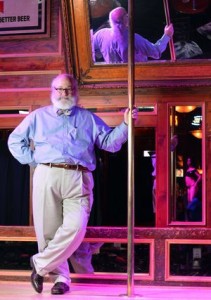By Bill Torpy – The Atlanta Journal-Constitution
A little known fact, learned while speaking with lawyer Alan Begner: The 1960s musical “Hair” helped make Atlanta one of the country’s rare bastions of nude dancing.
This is the naked truth.
Begner, who is distinguished by his own hair — a full, fluffy white beard and accompanying ponytail — said the city’s thriving adult entertainment industry was an “unintended consequence” of a long ago legal morality battle that still ripples today.
But more on that later. For 31 years, Begner has been in the vanguard of holding back the Forces of Wholesomeness. He represents most of metro Atlanta’s nude dancing joints and, along with his wife and law partner, Cory, a good portion of its naughty novelty shops. It’s a good living.
The newly created city of Brookhaven wants to close the Pink Pony, neighboring Doraville annexed and wants to shutter the Oasis, and Atlanta recently tried — unsuccessfully — to sanitize the Cheshire Bridge corridor. Begner is or was involved in all those fights.
Let us not forget Sandy Springs, the well-heeled north metro city that was created in 2005 and almostimmediately set out to close the three nude clubs in its limits.
They are all still open.
Begner, a Sandy Springs resident, portrays his clients as small business owners struggling against government overreach, as pariahs operating legally and within their constitutional limits. The nude bars in Brookhaven and Doraville “are not insensitive clubs located next to churches. They police themselves very strongly. They provide hundreds of jobs and pay taxes. The only reason (why the cities want) to ruin these clubs is morality. But morality is an improper motive to use.”
“Dancing has become so mainstream,” he said last week. “It’s just sexual fantasy on loan. It’s kind of on the outer edge of society’s mores, like boxing. I really don’t see what the big fuss is.”
Although he has been surrounded by seediness for decades, Begner is quite conventional. He has been married (to the same woman) for 42 years and has a son who’s a wilderness therapy counselor. He’s conservative in conversation, usually keeping to points of law or evidence, even when it’s prurient.

He has represented scores of cops charged with in-house violations, kept civil rights lion Hosea Williams out of jail on frequent driving violations and has carved out a healthy, but relatively run-of-the-mill, practice of getting and keeping liquor licenses for more than 100 stores and bars where employees remain clothed.
Former Fulton County Judge Gino Brogdon presided over a 1998 trial where the owner of a novelty shop was convicted of misdemeanor obscenity charges, although the mostly female jury criticized the law as “archaic.” Brogdon recalled that the week-long trial carried testimony and evidence of sexual devices with names that “would make grandma’s hair raise.”
“There were many red-faced moments in the courtroom,” said Brogdon. “But through it all, Begner came across almost as an academic. Alan makes you think about the law, the theory, the purpose, the public policy implications. Plus, he’s got a full-court game.”
Begner is an Atlanta boy who graduated from Grady High in the ’60s, who became a lawyer in the ’70s and took on cases representing society’s aberrant: A Klansman, a Communist, a mobster.
It was 1971 when a federal judge made a ruling that created a legal niche that would provide future lawyer Begner a career. The hippie stage production of “Hair” was coming to the Atlanta Civic Center. City officials, aghast at a short nude scene in the production, called it “obscene and pornographic” and banned it.
U.S. District Judge Newell Edenfield ruled against the city, saying the nudity was protected by the First Amendment. He wrote: “Even if defendants are acting with the best of intentions — and this court does not doubt that — they simply may not dictate what the public may view and what it may not.”
“Judge Edenfield ruled nudity and obscenity are not the same and that nudity was protected speech,” said Begner, who then smiled. “And the Atlanta clubs went nude the next day.”
In 1982, Begner was called by the now-defunct “She Club” after he successfully represented a revolutionary with a free-speech defense. In 1987, with the Democratic National Convention a year from coming to Atlanta, the Georgia legislature voted to make it illegal to sell alcohol at nude dancing establishments. In 1989, the state Supreme Court overturned that law, saying that nekkid dancing was free expression.
After that decision and with local ordinances in doubt, several clubs opened in neighboring Dekalb County, what Begner calls another unintended consequence of the legislators’ actions.
Dekalb officials almost immediately moved to close those businesses. In the early 1990s, Begner said the clubs offered to call off their legal dogs and settle, limiting the number of nude clubs in DeKalb at five. “They said, ‘No,’ and four more opened after the law was struck down (by a DeKalb judge),” Begner said. “Another unintended consequence.”
In 2001, after a decade of litigation, the nine nude clubs in unincorporated DeKalb agreed to be grandfathered and pay special fees, with the stipulation that no more come into business. Eight still operate, including the clubs in what are now Doraville and Brookhaven.
Localities have gotten smart about limiting nude clubs through zoning and alcohol licenscing laws. At the height, the early 1990s, there were about 45 clubs in metro Atlanta. Now, he said there are “probably 34.”
“It’s hard to put an existing club out of business,” he said. “Over time, we’ll keep losing them. It’s a no-growth industry.”
But in the meantime, Begner will remain a busy man.
